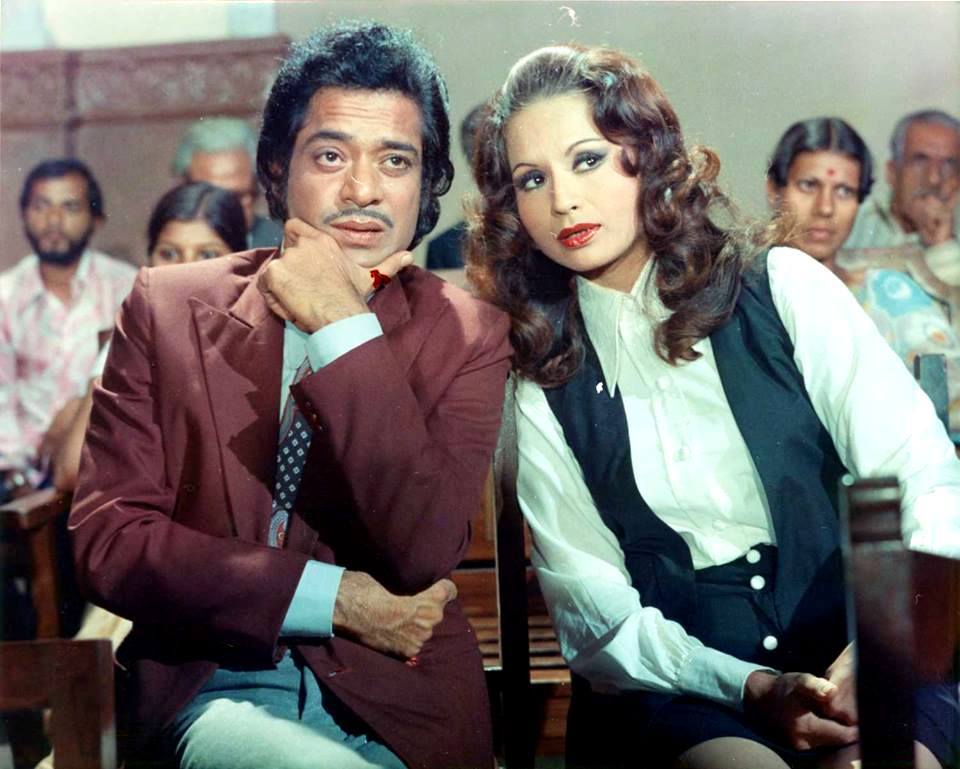Tribute to Pride of Pakistan legendary actor Mohammad Ali
Great actor Mohammad Ali (19 April 1931 - 19 March 2006) will be remembered for his versatile roles and heavy voice which helped him perform passionately. He worked with Radio Pakistan Hyderabad first as a broadcaster and then as actor for about a decade before he was picked up for films in the sixties.
Born in 1931 at Rohtak, #India, Mohammad Ali, affectionately known as Ali Bhai, migrated to #Pakistan soon after partition and settled in Multan. From there, he went to Hyderabad and lived there for many years.
Ali started his silver screen career when Fazal Ahmad Karim Fazli, whose two brothers Hasnain Fazli and Sabtain Fazli were already in the showbiz, gave him a role in his first film Chiragh Jalta Raha with Zeba and Deeba. The film was released in 1962. Interestingly, Mohammad Ali played the role of a villain in his maiden film.
Later, more producers offered Ali the villainous roles in their films. Director Munawwar Rasheed’s Bahadur, Iqbal Yusuf’s Daal Main Kala and Javed Hashmi’s Dil Ne Tujhe Maan Liya also featured him in the negative role.
The first film in which Ali played the lead was Shararat directed by Rafique Razvi alias Bapoo. The heroine in the film was Bahar. It was this film that took him to new heights of fame.
But he took his audience by surprise by performing a character role in Khamosh Raho, a film written by Riaz Shahid and directed by Jameel Akhtar in 1964. This film won him the first Nigar Award. Later, he won many awards in a number of films.
Another memorable role #MohammadAli played was in Aag Ka Darya. Its story and dialogues were also written by Riaz Shahid. Shamim Ara was the female lead of the film, which was directed by Humayun Mirza. It was released in 1966.
He also won awards in Hasan Tariq’s Kaneez in 1965, director Laeeq Akhtar’s Saiqa in 1968, Hasan Tariq’s Wehshi in 1971, Ali Sufyan Afaqi’s Aas in 1973, Shabab Kairanvi’s Aeena Aur Soorat, director Masood Pervez’s Haider Ali in 1978 and Hasan Tariq’s Doorian in 1984.
This was the year when he was conferred upon the Pride of Performance award and appointed the prime minister’s adviser on cultural affairs.
Some of other great films, whose success can be attributed to the role Mohammad Ali played in them, include director Shabab Kairanvi’s Insaan Aur Admi, Insaaf Aur Qanoon, Dil Aik Aeena, Daaman Aur Chingari and Aeena Aur Soorat and S. Suleman’s Aag, Jaise Jaante Nahi, Lori, Mohabbat Rang Laye Gi, Teri Soorat Meri Aankhen and Ik Phool Ik Pathar.
Mohammad Ali also starred in the main lead in Raza Mir’s Asra, Arzoo, Professor and Dil Ke Daagh. He was also the hero in Jafar Bukhari’s Samaj, Luqman’s Mahal, Duniya Na Mane and Parchain and Iqbal Yusuf’s Tum Mile Pyar Mila, Badnam, Sangram, Aag Ka Samundar and Ann Data.
S. A. Hafiz cast him in the main lead in Sajda, Nadia Ke Paar and Barat and Hasan Askari in Salakhen, Aag, Kinara and Doorian. Director Farid Ahmad cast him in the lead against Iranian artiste Shahpara in his film Jan Pehchan which was one of the early feature films produced as a joint venture.
The last film which starred Mohammad Ali was Kirai Ke Qatil directed by S. Suleman and released in 1989.
Ali performed a character role in a film which had Babra Sharif and Ismael Shah in lead roles.
He was very choosy and accepted only a few films in a year. He usually worked in about a dozen films a year. But, as many as 23 films, starring Mohammad Ali, were released in 1975, which is the year of the highest number of his movies.
Similarly, he played the male lead in 14 films in 1974, and 13 in 1982. He also played an insignificant role along with his wife Zeba (they paired as parents) in an Indian film Clerk in 1990, when he had almost left the film industry in Pakistan.
Mohammad Ali started losing interest in the showbiz towards the mid 1980s when the industry was being vulgarized by people who had no artistic background. This was the period when the industry in Pakistan produced about 95 per cent films in regional languages.
Also there was a trend of making bilingual films. For example, many Punjabi-Urdu and Pushto-Urdu films were made towards the end of 1980s.
Mohammad Ali has to his credit a few Punjabi films like Sher Di Bachi, Wadda Khan and Woht. He also worked in two Pushto films, both in 1986. The first was Damoro Intaqam which was produced by the Evernew Films and directed by Shehzad Gul. Salma Agha, Javed Sheikh and Taalish were other actors in the film. His second Pushto film was Dushman Kaka which also starred Badar Munir.
Ali worked with all the top heroines of his time. But in most of them, he paired with Zeba. Their working together brought them so close to each other that they married in 1969. The couple did not have a child, but Ali adopted a daughter from an earlier marriage of wife Zeba.
His other heroines, included Nayyar Sultana, Neelo, Rani, Deeba, Shabnam, Babra Sharif, Nisho, Aasya and Mumtaz.
Mohammad Ali developed cardiac problem about 10 years ago and had been through critical days of his life in a hospital about six years ago. He courageously fought death. But this time around, he lost the battle and yielded to the merciless hands of the nature.
He was one of the greatest actors the Pakistan film industry ever had. But more than that, he was a great human being.
He was also a friend of many political leaders, including Zulfikar Ali Bhutto, Gen. Zia ul Haq & Mian Nawaz Sharif.


















Comments
Post a Comment